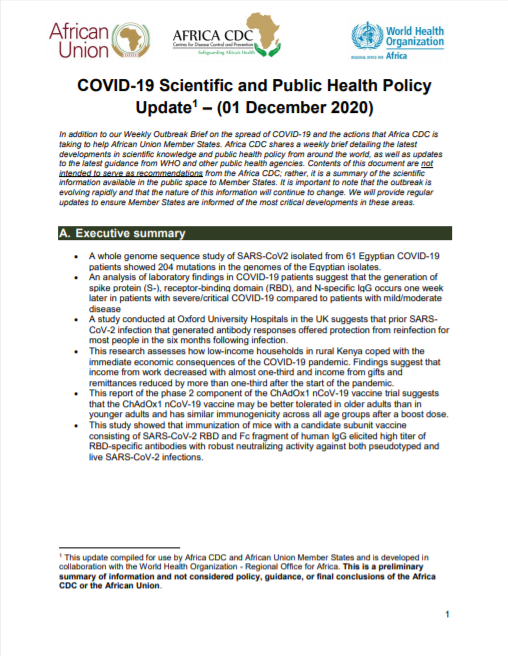In addition to our Weekly Outbreak Brief on the spread of COVID-19 and the actions that Africa CDC is taking to help African Union Member States. Africa CDC shares a weekly brief detailing the latest developments in scientific knowledge and public health policy from around the world, as well as updates
to the latest guidance from WHO and other public health agencies. Contents of this document are not intended to serve as recommendations from the Africa CDC; rather, it is a summary of the scientific information available in the public space to Member States. It is important to note that the outbreak is evolving rapidly and that the nature of this information will continue to change. We will provide regular updates to ensure Member States are informed of the most critical developments in these areas.
A. Executive summary
A whole genome sequence study of SARS-CoV2 isolated from 61 Egyptian COVID-19 patients showed 204 mutations in the genomes of the Egyptian isolates.
An analysis of laboratory findings in COVID-19 patients suggest that the generation of spike protein (S-), receptor-binding domain (RBD), and N-specific IgG occurs one week later in patients with severe/critical COVID-19 compared to patients with mild/moderate disease
A study conducted at Oxford University Hospitals in the UK suggests that prior SARSCoV-2 infection that generated antibody responses offered protection from reinfection for most people in the six months following infection.
This research assesses how low-income households in rural Kenya coped with the immediate economic consequences of the COVID-19 pandemic. Findings suggest that income from work decreased with almost one-third and income from gifts and remittances reduced by more than one-third after the start of the pandemic.
This report of the phase 2 component of the ChAdOx1 nCoV-19 vaccine trial suggests that the ChAdOx1 nCoV-19 vaccine may be better tolerated in older adults than in younger adults and has similar immunogenicity across all age groups after a boost dose.
This study showed that immunization of mice with a candidate subunit vaccine consisting of SARS-CoV-2 RBD and Fc fragment of human IgG elicited high titer of RBD-specific antibodies with robust neutralizing activity against both pseudotyped and live SARS-CoV-2 infections.
